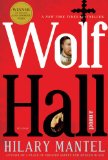Summary | Excerpt | Reading Guide | Reviews | Beyond the Book | Readalikes | Genres & Themes | Author Bio

A Novel
by Hilary Mantel
He doesn’t eat for a day or so; it hurts too much. But by the time he reaches Dover the big gash on his scalp has closed, and the tender parts inside, he trusts, have mended themselves: kidneys, lungs and heart.
He knows by the way people look at him that his face is still bruised. Morgan Williams had done an inventory of him before he left: teeth (miraculously) still in his head, and two eyes, miraculously seeing. Two arms, two legs: what more do you want?
He walks around the docks saying to people, do you know where there’s a war just now?
Each man he asks stares at his face, steps back and says, "You tell me!"
They are so pleased with this, they laugh at their own wit so much, that he continues asking, just to give people plea sure.
Surprisingly, he finds he will leave Dover richer than he arrived. He’d watched a man doing the three- card trick, and when he learned it he set up for himself. Because he’s a boy, people stop to have a go. It’s their loss.
He adds up what he’s got and what he’s spent. Deduct a small sum for a brief grapple with a lady of the night. Not the sort of thing you could do in Putney, Wimbledon or Mortlake. Not without the Williams family getting to know, and talking about you in Welsh.
He sees three elderly Lowlanders struggling with their bundles and moves to help them. The packages are soft and bulky, samples of woolen cloth. A port officer gives them trouble about their documents, shouting into their faces. He lounges behind the clerk, pretending to be a Lowland oaf, and tells the merchants by holding up his fingers what he thinks a fair bribe. "Please," says one of them, in effortful English to the clerk, "will you take care of these English coins for me? I find them surplus." Suddenly the clerk is all smiles. The Lowlanders are all smiles; they would have paid much more. When they board they say, "The boy is with us."
As they wait to cast off, they ask him his age. He says eighteen, but they laugh and say, child, you are never. He offers them fifteen, and they confer and decide that fifteen will do; they think he’s younger, but they don’t want to shame him. They ask what’s happened to his face. There are several things he could say but he selects the truth. He doesn’t want them to think he’s some failed robber. They discuss it among themselves, and the one who can translate turns to him: "We are saying, the English are cruel to their children. And coldhearted. The child must stand if his father comes in the room. Always the child should say very correctly, ‘my father, sir,’ and ‘madam, my mother.’ "
He is surprised. Are there people in the world who are not cruel to their children? For the first time, the weight in his chest shifts a little; he thinks, there could be other places, better. He talks; he tells them about Bella, and they look sorry, and they don’t say anything stupid like, you can get another dog. He tells them about the Pegasus, and about his father’s brew house and how Walter gets fined for bad beer at least twice a year. He tells them about how he gets fines for stealing wood, cutting down other people’s trees, and about the too- many sheep he runs on the common. They are interested in that; they show the woolen samples and discuss among themselves the weight and the weave, turning to him from time to time to include and instruct him. They don’t think much of English finished cloth generally, though these samples can make them change their mind ... He loses the thread of the conversation when they try to tell him their reasons for going to Calais, and different people they know there.
He tells them about his father’s blacksmith business, and the English-speaker says, interested, can you make a horse shoe? He mimes to them what it’s like, hot metal and a bad- tempered father in a small space. They laugh; they like to see him telling a story. Good talker, one of them says. Before they dock, the most silent of them will stand up and make an oddly formal speech, at which one will nod, and which the other will translate. "We are three brothers. This is our street. If ever you visit our town, there is a bed and hearth and food for you."
Excerpted from Wolf Hall by Hilary Mantel. Copyright © 2009 by Hilary Mantel. Excerpted by permission of Henry Holt and Company. All rights reserved. No part of this excerpt may be reproduced or reprinted without permission in writing from the publisher.
Your guide toexceptional books
BookBrowse seeks out and recommends the best in contemporary fiction and nonfiction—books that not only engage and entertain but also deepen our understanding of ourselves and the world around us.